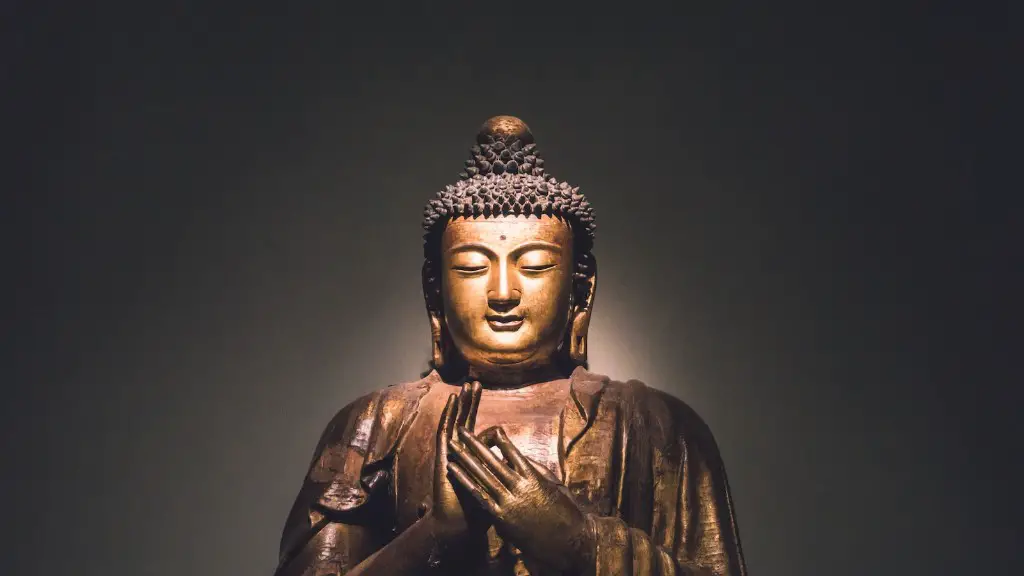Buddhism is a religion without god because it is based on the teachings of Siddhartha Gautama, who was born a prince in what is now Nepal. Siddhartha Gautama renounced his life of privilege and became a monk. He spent years meditating and studying different religious texts. Siddhartha Gautama’s teachings became the core of Buddhism. The key principles of Buddhism are the four Noble Truths and the Eightfold Path. The Four Noble Truths are that life is suffering, that suffering is caused by desire, that suffering can be ended by eliminating desire, and that this can be accomplished by following the Eightfold Path. The Eightfold Path is a set of guidelines for ethical and moral living. These guidelines are divided into eight sections: right understanding, right thought, right speech, right action, right livelihood, right effort, right mindfulness, and right concentration.
Buddhism is a religion without god because it is based on the belief that enlightenment can be achieved through one’s own efforts. Buddhists believe that there is no need for a god or other external source of guidance in order to achieve enlightenment. Instead, they focus on using meditation and other practices to develop their own inner wisdom and spirituality.
Does Buddhism have no god?
Buddhists believe in the Four Noble Truths and the Eightfold Path, which are the means to achieve nirvana. Nirvana is the goal of Buddhism and is a state of perfect peace and enlightenment. There is no belief in a personal god or any kind of deity in Buddhism. The Buddha is not thought of as a god, but as a teacher who showed the way to achieve nirvana.
Nontheism is the belief that there is no god or gods. While many approaches to religion exclude nontheism by definition, some inclusive definitions of religion show how religious practice and belief do not depend on the presence of a god or gods. Nontheism has been applied and plays significant roles in Hinduism, Buddhism, and Jainism. In Hinduism, nontheism is represented in the schools of thought known as Samkhya and Vedanta. Buddhism is based on the Four Noble Truths, which do not require the belief in a god or gods. Jainism is based on the principle of ahimsa, which also does not require the belief in a god or gods.
Why Buddhism is not a religion but a way of life
Buddhism does not focus on the worship of a supreme god or deity. Instead, followers of Buddhism seek to achieve enlightenment, or a state of inner peace and wisdom. Once a follower reaches this spiritual echelon, they are said to have experienced nirvana. The founder of Buddhism, Buddha, is considered an extraordinary being, but not a god.
Brahma is one of the most important and revered figures in Buddhism. He is seen as a protector of the teachings and a guardian of the Dharma. He is never depicted as a creator god, but instead is seen as a powerful and benevolent figure who helps those who follow the Buddhist path.
What is a religion with no god called?
Atheism is one thing: A lack of belief in gods. It is simply a rejection of the assertion that there are gods. Atheism is too often defined incorrectly as a belief system.
The term “atheist” simply means “one who does not believe in the existence of a god or gods.” There is no inherent negative connotation to the term – it simply describes a lack of belief. However, in many cultures and religions, atheism is seen as a negative thing. This is likely due to the fact that many religions teach that their god is the only true god, and that all other gods are false. Therefore, those who do not believe in the existence of any god are seen as rejecting the only true god, and this is often seen as a bad thing.
What religion is without a god?
Atheism is the belief that there is no god. It is not a positive belief in anything, but simply a rejection of the belief that there is a god.
Buddhism is a religion centered around the teachings of the Buddha and the goal of spiritual liberation. Although the Buddha himself rejected the idea of a creator god, some Buddhist philosophers have argued that belief in an eternal god can be a distraction for humans seeking enlightenment. However, Buddhism is not a theistic religion, and ultimately, the focus is on achieving liberation from the cycle of suffering.
Is Buddhism a religion or spirituality
Buddhism is a religion and philosophy founded in India by Siddhartha Gautama in the 5th century BCE. The Buddhist tradition recognizes him as the Supreme Buddha of our age. Siddhartha Gautama was born into a royal family in present-day Nepal. He left his family at the age of 29 in search of an understanding of the human condition. After six years of study and practice with different teachers, he is said to have achieved enlightenment. He then spent the remainder of his life teaching the Dharma, or truths that he had realized.
Buddhism spread throughout Asia via the Silk Road, and by the 10th century had reached China, Japan, Korea, and Vietnam. Today, it is the world’s fourth-largest religion, with over 520 million followers (Buddhists) who comprise seven percent of the global population.
Buddhist teaching generally views life and death as a continuum, believing that consciousness (the spirit) continues after death and may be reborn. Death can be an opportunity for liberation from the cycle of life, death and rebirth.
Do Buddhists believe in heaven?
In Buddhism, there is no concept of punishment or reward and there is no divine being who decides who goes to hell or heaven There is merely the illusory results of our thought, words and deeds, which we call karma.
Buddha was a very important teacher who founded one of the world’s major religions. He was different from other teachers at the time because he did not claim to be a God or to have any external power. He was simply a human being. This made him more relatable to his students and followers.
What do Buddhist believe about Jesus
There are some high level Buddhists who have drawn analogies between Jesus and Buddhism. In 2001, the Dalai Lama stated that “Jesus Christ also lived previous lives”, and added that “So, you see, he reached a high state, either as a Bodhisattva, or an enlightened person, through Buddhist practice or something like that” Thich.
Eastern religions are a wide variety of religions that originated in East Asia. These religions include Buddhism, Hinduism, Jainism, Meivazhi, Sikhism, and Taoism. Each of these religions has their own unique beliefs and practices.
Which religion is declining the fastest?
As Christianity continues to grow globally, it is expected to experience the largest net losses from switching. About 40 million people are projected to switch into Christianity, while 106 million are projected to leave, with most joining the ranks of the religiously unaffiliated. This trend is expected to continue over the coming decades, as Christianity loses more and more people to secularism and other religions.
Matthias Knutzen was the first known atheist in early modern times. He published three atheist writings in 1674. He was a critic of religion and his views were not popular.
Conclusion
Buddhism is a unique religion in that it does not believe in a supreme being or god. Instead, it teaches that the way to true enlightenment and Nirvana is through one’s own actions and thoughts. This philosophy of self-reliance and individual Enlightenment runs counter to many of the other popular religions which focus on an all-powerful being that controls everything.
Buddhism is a religion without god because it does not believe in a supreme being who controls everything. Instead, it teaches that people are responsible for their own actions and that they can create their own happiness.




